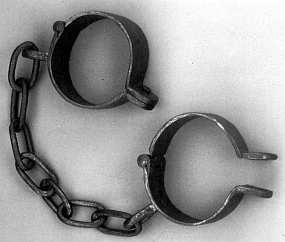 In my previous post in this two-part series, I claimed that while many Christian talk about freedom in Christ, few live that talk. As I get older, I increasingly see why this is.
In my previous post in this two-part series, I claimed that while many Christian talk about freedom in Christ, few live that talk. As I get older, I increasingly see why this is.
One reason that few of us truly experience Christ’s freedom is our desperate fear that we will not be liked, that we’ll be rejected and tossed by the world into a class of people labeled losers. So we play the world’s restrictive and ensnaring game, and all reality of freedom goes out the window. The world pipes, and we dance. Only by dying to self and to the world do we experience genuine freedom.
The other reason for restrictions on freedom come from within the American Church, not without. That solution, too, starts with dying to self, but in a more oblique way that not everyone sees.
Theologian Karl Barth, when asked to sum up his knowledge, was said to reply with the words of a simple song too often relegated to children, “Jesus loves me, this I know, for the Bible tells me so.”
What I’m realizing is that my learning often gets in my way of being a simple Christian. I can get bogged down in Greek verb forms, or I can tussle with distinctions between supralapsarianism and infralapsarianism. I start thinking too much. I go off on tangents and wander in weird places.
Simplicity is not the ideal state in the minds of most people in the West. We love our complexity. Set a simple task before a half dozen business people, and the next thing you know, tasks forces arise, due diligence models erupt, and the original task, perhaps something as simple as “we need to refill this pitcher of water,” becomes a fiasco. The cartoon Dilbert is one of the most popular today because it deflates the pomposity and stifling adherence to rules that make so much of modern day business practice so ineffective.
The problem for the Church in America is that we are often worse than the hapless business world of Dilbert. We pile all sorts of junk onto the mission of Jesus, then we wonder why the mission goes awry and the people who are a part of it seem to reflect the opposite of “the joy of the Lord.”
Jesus summed up Isaiah:
“‘These people draw near to me with their mouth, and honor me with their lips; but their heart is far from me. And in vain do they worship me, teaching as doctrine rules made by men.'”
—Matthew 15:8-9
How often do we run the test to see if our everyday practice of the faith is nothing more than “rules made by men”?
We can build systematic theologies out of anything, but Jesus fought against that tendency. When a lover of complexity attempted to corner him on doctrine, here is how Jesus responded:
Jesus said to him, “‘You shall love the Lord your God with all your heart, with all your soul, and with all your mind.’ This is the first and great commandment. A second likewise is this, ‘You shall love your neighbor as yourself.’ The whole law and the prophets depend on these two commandments.”
—Matthew 22:37-40
Do we get the profundity of that final sentence? Jesus says that everything that has been revealed by God on how we are to live comes down to loving Him and loving others! I see a lot of Christians who burden themselves and everyone else with their busybodyness. They use their own systematic theologies to gleefully point out everyone’s errors, but they forget that everything they supposedly know is meant to add up to loving God and loving one’s neighbor.
That tendency explains why so much of the Church is at war with itself and why church splits are the norm rather than the exception.
In the words of the great orator Rodney King, “Can’t we all just get along?”
No, Rodney, we can’t—as long as we are bound up in legalism and judgmentalism.
Anymore, the only rules I impose on myself in this walk of faith are
Am I loving the Lord?
Am I loving other people?
I’m letting everything else go.
The ability to ask those two questions has to start in dying to self—again. Because asking those two questions, finding the answer, and putting that answer into practice demands that I not live for myself. I cannot love if I am at the center of that love.
I quoted a lot of Scripture verses yesterday on the positives of dying. I left some to use for today:
For while we were living in the flesh, our sinful passions, aroused by the law, were at work in our members to bear fruit for death. But now we are released from the law, having died to that which held us captive, so that we serve in the new way of the Spirit and not in the old way of the written code.
—Romans 7:5-6
(That’s one of the most neglected verses in the Bible, if you ask me. Too many of us remain prisoners of the “old way of the written code” and seem to have no comprehension of what it means to “serve in the new way of the Spirit.”)
For through the law I died to the law, so that I might live to God. I have been crucified with Christ. It is no longer I who live, but Christ who lives in me. And the life I now live in the flesh I live by faith in the Son of God, who loved me and gave himself for me. I do not nullify the grace of God, for if righteousness were through the law, then Christ died for no purpose.
—Galatians 2:19-21
If with Christ you died to the elemental spirits of the world, why, as if you were still alive in the world, do you submit to regulations—”Do not handle, Do not taste, Do not touch” (referring to things that all perish as they are used)—according to human precepts and teachings? These have indeed an appearance of wisdom in promoting self-made religion and asceticism and severity to the body, but they are of no value in stopping the indulgence of the flesh.
—Colossians 2:20-23
I look around at the state of Evangelicalism today and it seems to have descended into little more than mouthing “do not handle, do not taste, do not touch.” And we can complain about whether that’s truly the case or not, but sometimes it’s all about perceptions. If you ask an unbeliever enough questions in this regard, you’ll probably hear people sum up Christianity as a religion for folks who are against doing stuff.
Fact is, Christianity is not defined by the rules of what it is against, but by the truth of what (and whom) it is for.
But Dan, you say, what is Christianity for? Here’s a simple theological answer: Love the Lord and love people. I can sum that up in a couple verses too:
For to me to live is Christ, and to die is gain.
—Philippians 1:21
For we are his workmanship, created in Christ Jesus for good works, which God prepared beforehand, that we should walk in them.
—Ephesians 2:10
No matter how poor our memories might be, I think each of us can memorize those two verses.
I’ve reached the age that I’m not so worried if I wear white socks with black shoes. I’ve stopped caring what other people think of me. I’ve died to all that. The only thing that matters is what the Lord thinks.
In fact, I’ve reached the point where I no longer care what the religious people think, which means I don’t care what many fellow Christians think. Too many religious people are busybodies who don’t understand Christianity at all because they’re mired in rules, laws, and trying to conform to a misplaced sense of righteousness. I feel sorry for them, actually.
When I read the Bible, this Christian life comes off so much simpler than what we have made it. This life is not about how long our quiet time is and when. It’s not about looking good before the religious people.
Freedom in Christ is letting everything else go, letting it die, so that we can live by the Spirit.
And when our physical bodies finally wear out, we won’t be judged by God for how much we know or for how well we applied “godly principles” and rules to life. As Jesus Himself said, it will all come down to whether we lived a life that showed we loved Him and loved other people.
That’s true freedom.
For you were called to freedom, brothers. Only do not use your freedom as an opportunity for the flesh, but through love serve one another. For the whole law is fulfilled in one word: “You shall love your neighbor as yourself.” But if you bite and devour one another, watch out that you are not consumed by one another. But I say, walk by the Spirit, and you will not gratify the desires of the flesh. For the desires of the flesh are against the Spirit, and the desires of the Spirit are against the flesh, for these are opposed to each other, to keep you from doing the things you want to do. But if you are led by the Spirit, you are not under the law.
—Galatians 5:13-18

 Instead they live broken lives, always striving, always attempting to do better, trying harder the next time, slaving to get it right—until it kills them.
Instead they live broken lives, always striving, always attempting to do better, trying harder the next time, slaving to get it right—until it kills them. and poor ol’ Charlie Brown is always forced to admit, “I got a rock.”
and poor ol’ Charlie Brown is always forced to admit, “I got a rock.”